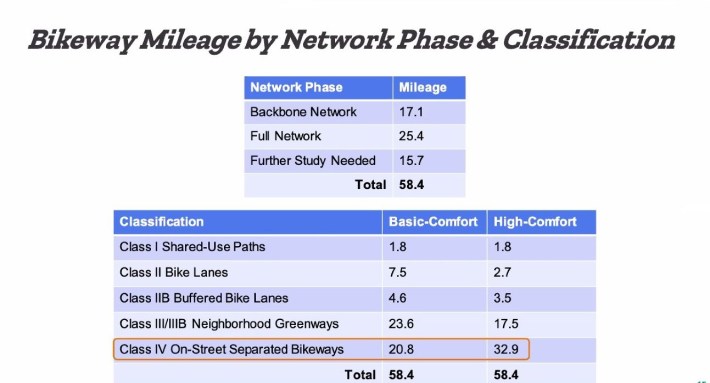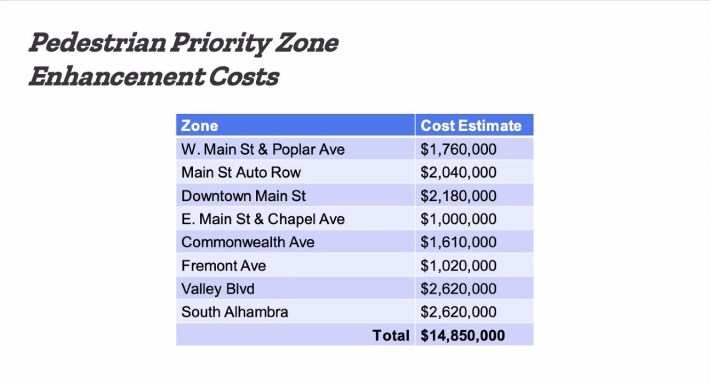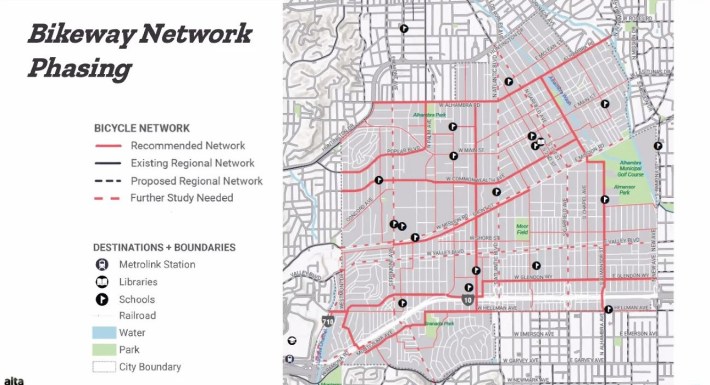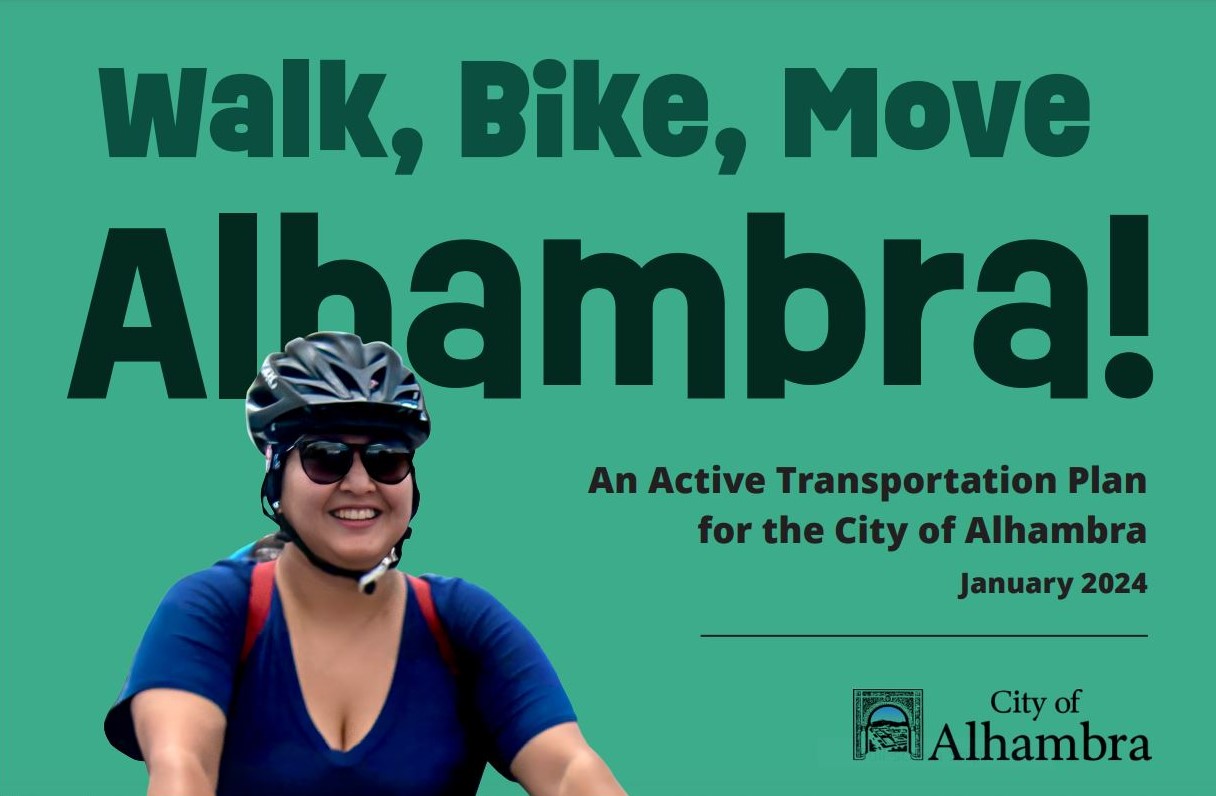On Monday, January 8 Alhambra City Council unanimously voted yes on a package of staff recommendations related to the city’s Bike and Pedestrian Improvement Plan. These include:
- Authorizing a reallocation request with Metro for $14.4 million in Measure R funds previously earmarked for road widening on Fremont Avenue to now be used on the Bike/Ped plan implementation
- Amending the city’s contract with Alta Planning + Design to include grant support services for the duration of the project for a fee of $50,000
- Accepting an environmental review exemption for the plan
- And finally, though the council seemed poised to adopt the plan, to delay a vote on adoption (likely until February 12th), at the behest of Alhambra residents
Moving the date back
The plan – which prescribes a 50+ mile bike lane network and 8 “Pedestrian Priority” zones for major infrastructure improvement – had been discussed in some detail at previous council meetings and several public workshops.
(Notable changes to the plan mentioned at Monday’s meeting include upping the proposed bike lane mileage to 58 miles, and a lowered cost estimate for the Pedestrian Priority zones from $19.6 million down to $14.9 million.)


However, numerous Alhambrans expressed frustration that the final plan’s 200+ page pdf was made public on Thursday January 4, only a few days before the council was to vote on its adoption.
Among them was Tomas Trezos. “Unless there is a compelling reason to finalize it tonight, I ask you to give people some reasonable time to review it and incorporate their suggestions.” Trezos said.
To that end, Mayor Ross Maza motioned to move the adoption vote back until February. Councilmember Katherine Lee also said she would like the council to take part in a study session of the plan.
Cliff Bender, a member of Alhambra’s Transportation Commission, said that the Commission hasn’t been privy to the development of the plan. City staff mentioned the possibility of booking a special meeting with the Transportation Commission before its next scheduled regular meeting in March.
Piecemeal funding
But residents were also concerned about funding for facilities in the plan. At the moment, there is no money earmarked for implementation. The city had applied for Metro funding before, but was turned down. It now hopes Metro will approve transferring $14.4 million from the abandoned Fremont Avenue widening project (from Mission Road to Valley Boulevard) to the bike/ped plan.
That explains the rush to get the plan adopted, according to Vice Mayor Sasha Renée Pérez. “I just want to make sure that members of the public realize that we do have to approve this in order for us to start going after those Measure R dollars,” said Perez.
Assistant City Manager Lucy Garcia added context. “We would have to define what that $14.4 million project looks like. So it's not sufficient to say various bike and pedestrian improvements, we're gonna have to be very specific.”
Some public commenters weren’t keen on the idea of funding the plan (likely to cost upwards of $40 million overall) with piecemeal grants, though this is how many cities commonly gradually implement many types of transportation facilities. This was brought up over and over. Here’s what Mike Lawrence had to say about it.
“Just look at our neighbors. Temple City and Rosemead did that. They got some funding, they built some beautiful bikeways that don't go anywhere, and people don't use them.” said Lawrence.

Where did Lawrence and several other commenters suggest city council find the money to fund the plan all at once? A different plan to widen Fremont and reconfigure its freeway ramps. Forget the freeway and put that money towards active transportation, they say.
“Here's Alhambra with the golden opportunity to use some Measure R funding, and we're not doing it.” Lawrence said. “Why isn't the safety and quality of our lives given priority over bringing more cars and pollution into our neighborhoods?”
Garcia explained the intention is to build a stronger application for seeking matching funds from the next round of Caltrans’ Active Transportation Program grants (or elsewhere).
“This piecemeal idea is really no longer supported by many of the funding agencies. We know that.” said Garcia. “And so therefore the $14.4 million is a pretty valuable opportunity to leverage in a grant application and become more competitive under that resource and possibly get a matching $14.4 million that could give us a total of $28-$29-$30 milion.”
Councilmember Jeffrey Maloney said using Measure R money from the Fremont freeway project is indeed a possibility, but to be discussed another time.
“The money that's allocated to the 10, the Fremont 10 project, that's not on the agenda tonight. We can't take action on it tonight and we were not allowed to get into depth about that. That is following a separate process. But absolutely all of those funds are on the table.” said Maloney.
Going forward
Two public input meetings have been announced (details below). In the meantime, the final draft plan can be perused here.
- Tuesday, January 23rd at 6:00 PM via Zoom. Register for the Zoom link here.
- Thursday, February 1st at 5:00 PM at Alhambra Library's Reese Hall (101 S 1st Street, Alhambra CA 91801).
California Active Transportation Program (ATP) Grant applications will open in March and close in June. Alhambra and Alta Planning also stated intention to apply for grants from Southern California Association of Governments (SCAG), Highway Safety Improvement Program, and the California Office of Traffic Safety.
Streetsblog’s San Gabriel Valley coverage is supported by Foothill Transit, offering car-free travel throughout the San Gabriel Valley with connections to the Gold Line Stations across the Foothills and Commuter Express lines traveling into the heart of downtown L.A. To plan your trip, visit Foothill Transit. “Foothill Transit. Going Good Places.”Sign-up for our SGV Connect Newsletter, coming to your inbox on Fridays!






